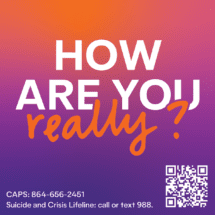The signage catches your attention as you navigate Clemson’s main campus.
Images of students paired with phrases such as “You are not alone” and “Ask. Listen. Be There.” adorn the facades of Memorial Stadium and the kiosk on Perimeter Road in the heart of the athletic district. They’re present on library bridge and in the atrium of Hendrix Student Center.
In addition to aforementioned signage — which will span the entirety of Clemson’s digital network at three distinct time periods this semester — mirror clings are being installed in academic buildings and residence halls containing the phrase “How are you Really?” with calls to action for both local resources via Counseling and Psychological Services and nationally through the 988 crisis line.

Through these items, Clemson is re-issuing a mental health campaign this fall with the hopes of spreading mental health awareness and building a campus of advocates. It’s all part of a more focused approach to creating a culture of care at Clemson.
One professor’s approach to supporting mental health
Ashley Fisk is a Clemson professor who has taught for 20 years in the English department. She’s bringing a unique approach to mental health advocacy borne out of a freshman composition class.
Over the past couple of semesters, Fisk has partnered with Healthy Campus and the Office of Teaching Effectiveness and Innovation to bring additional mental health resources into the classroom setting.
“Part of my course is teaching elements that make up a persuasive pitch,” she says. “We came up with the idea of students developing five-minute pitches and utilizing their own voice to promote resources inside the classrooms of other professors. When students speak to their peers, they’re more apt to listen. We worked with faculty who were very supportive.”
Fisk says one faculty member — Marianne Glaser — helped provide mental health exposure by way of persuasive pitches to roughly 500 students through her COMM 1500 sections alone.
“Mental health is something I’m super passionate about,” Fisk says. “Recognizing just how much the statistics have changed in the last few years, any way I can help bring that into light is a win-win for Clemson.”
Referrals through the CARE Network
One of the initial touchpoints for students in need is through the CARE Network. Managed by the Office of Advocacy and Success, the CARE Network is a conduit designed to connect students with supportive resources.

Some of the most common reasons for CARE Network referral include but are not limited to academics, adjustment, behavior, career, death, financial hardship, personal health, student engagement and relationship management.
A total of 2,116 CARE cases were reviewed and managed by the office from July 1, 2022 through June 30, 2023 — the second consecutive year the total number surpassed 2,000 reports.
Learn more on the CARE Network at Clemson.
Tigers Together Advocacy Training
The timing of Clemson’s campaign launch is apropos. September is National Suicide Prevention Month — a time to raise awareness and discuss a highly stigmatized topic.
Members of Clemson’s Healthy Campus team regularly provide resources to faculty and staff through Tigers Together Advocacy Training. Each session includes an introduction of student suicide statistics, discussion of myths and warning signs, review of effective communication skills, experiential exercises and guided role play.
“We want faculty members to participate in these trainings,” says Jennifer Goree, director of Healthy Campus. “We encourage that they use a values statement in their syllabi. Our goal, ideally, is for professors to make an intentional effort to cover mental health and suicide prevention awareness on every level of the student experience — undergraduate, master’s and doctorate.”
CAPS wrap-around service available 24/7
Counseling and Psychological Services (CAPS) saw an increase in student appointments of 11 percent this past year. In total, CAPS providers conducted 9,152 visits.
In October 2022, CAPS enhanced its ability to assist students outside of regular business hours at Redfern Health Center by introducing wrap-around care, available 24 hours a day and seven days a week when calling 864-656-2451. Calls after 4:30 p.m. on weekdays and during weekends, holidays or campus closures are now forwarded to an after-hours service, which assists students in the event of emergent needs.
“This new system allows CAPS to address student concerns more holistically, no matter when a need is identified,” says Birma Gainor, director.

